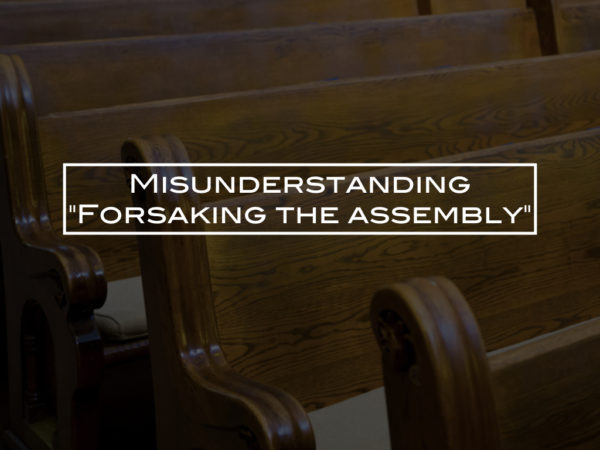Update: read my one-year reflection and retraction of this article here.
Desperate times call for desperate measures, the saying goes.
While there are plenty of varying opinions as to how desperate these times are, there’s no denying that the coronavirus spread must be taken seriously. For this reason, churches far and wide are having to consider how to comply with either laws (for large congregations in some areas) or recommendations (for groups of almost any size, anywhere in America). Such consideration has led many congregations to close their doors for the time being.
In response to this, some have made the claim that churches that cancel are violating the Bible’s command in Hebrews 10:25 to not forsake the assembly. In my experience, those who believe such are greatly outnumbered by those who don’t. It may be that this is one of those cases where the backlash to the backlash outnumbers the actual backlash itself 99-to-1. (Remember the case of the Starbucks cups that didn’t say “Christmas?”)
However, I still wanted to write to address the issue because, coronavirus or not, I believe that verse is one that has been misunderstood and misapplied for a long time.
First, let’s look specifically at the coronavirus-driven cancellations.
Neither biblically nor logically does it hold that such congregations are violating Hebrews 10:25. Biblically, the word “forsaking” has a meaning akin to the idea of desertion, somebody abandoning their church family. The book of Hebrews revisits the idea of falling away a number of times, and in this specific section the writer is heavily emphasizing the need to stand strong in response to all Jesus has done for us. He gives us a list of things we can do to stay strong, and this one that we can’t do if we want to stay strong. That’s why this verse doesn’t apply to our current situation. We aren’t talking about people who are drifting from the Lord. We are talking about people who would love nothing more than to be together worshiping Him. Hebrews 10:25 was not written with such people in mind.
Logically, just think of how often we use this same line of reasoning. Are our shut-ins forsaking the assembly because their medical status is such that they aren’t able to make it each week? Are people who have a decimated immune system due to cancer treatment forsaking the assembly by staying home? Is a healthy parent who stays home with their sick child forsaking the assembly? Of course not. I can’t imagine anyone would claim they are. Therefore we can understand that no one is forsaking the assembly when medical needs insist on our absence. Why, then, would it be a leap to extend that same understanding to our current situation?
Second, let’s look at the deeper misunderstanding of Hebrews 10:25.
It’s because we have a backward, businesslike view of the church that many see attendance “every time the doors are open” as the sign of faithfulness. Church is the location and/or the event that happens on Sunday, so their participation in “church” is centered on attendance. In the New Testament, the sign of a faithful Christian is the fruit they bear. Obviously a fruit bearing Christian is going to want to worship God, gather with their church family, and partake of the Lord’s supper each Sunday unless extreme circumstances prevent them. But that faithful attendance is a natural byproduct of a truly converted heart. It is not the end in itself.
On the other hand, there are those who are there “every time the doors are open” who bear no fruit whatsoever. If we get a person to attend regularly through guilt trips and threats of hell but they don’t love the Lord and don’t bear any fruit, we haven’t accomplished anything. This was why Jesus so heavily emphasized the anti-Pharisaical proposition that we should serve God from the inside out rather than merely performing external acts with a cold heart (see Matthew 23).
The other facet of this conversation is the immediate context of Hebrews 10:25. Because we tend to cite book-chapter-verse to prove points, it’s very easy to separate a verse from its context. If you’ll notice, though, this verse isn’t even a complete sentence, demanding us to read at least the rest of the sentence for context.
In verse 24, we are to “consider one another in order to stir up love and good works.” In other words, we need to be thinking about our church family and looking for ways we can push each other toward greater closeness and involvement. The “not forsaking the assembling of ourselves” phrase is then contrasted with a call to be “exhorting one another.” This is the same terminology used in Hebrews 3:13, where the writer called his audience to “exhort one another daily” so that no one would be hardened by sin’s deceitfulness. In other words, the opposite of “forsaking the assembling of ourselves” is not “be there every Sunday” but rather considering your church family, stirring each other up, and encouraging each other.
This isn’t to say that attendance (in regular circumstances) is unimportant. Quite the opposite. These verses set the bar way higher than just “you need to be there on Sunday.” Hebrews 10:25 is not just a call for people to stop skipping church. In fact, Sunday morning attendance really doesn’t even meet the bare minimum. Is it possible that there are those with a perfect attendance record who have done no more to encourage the brethren than a “How are you?” in passing in the hallway? Is it possible that there are those who have perfect attendance but never see or talk to their Christian family outside of the building? If so, have such people truly grasped the point of Hebrews 10:24-25?
Yes, being there when the church assembles together is important. No, church leaders are not being faithless if they choose to limit or cancel Sunday gatherings for a time. Pray for them, trust their judgment, and respect their leadership. And if you’re in that camp of critics, that goes for respecting God’s leaders in other congregations, too. Stop looking over the fence to judge what other Christians are doing and focus on serving your own instead.
But whether or not your church building’s doors are open this Sunday, I encourage you to ponder the true meaning of Hebrews 10:24-25. God wants us to build relationships with each other so we can keep each other from drifting and can help each other grow in the good works He has planned for us. If we have to do that without Sunday morning gatherings for a time, then let’s do so. But carry those habits with you. Once we get back to normal, let’s make sure we don’t fall into the mistake of thinking we’ve “not forsaken the assembly” just by our attendance.





